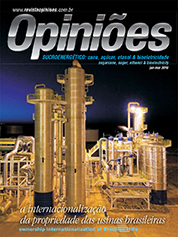Maurílio Biagi Filho
Member of the Economic and Social Development Committee of the Office of the Presidency of Brazil
Op-AA-23
A new ABC of sugarcane
There is already no way to deny that the sugarcane production outlook in Brazil changed with the passage from the 20th to the 21st Century. If before the main names in the industry comprised traditional immigrants’ surnames (Atalla, Balbo, Bellodi, Biagi, Ometto, Simioni, etc.), nowadays the sugarcane industry’s alphabet begins with ADM, Bunge, Cargill, Dreyfus... Coincidently, these are large foreign groups that, for the first time in 500 years, make it quite clear that the Brazilian sugar-based energy industry has matured to the point of awakening the interest of some of the most powerful players in international agribusiness.
After ten years, the industry’s internationalization already accounts for 25% of the crushed sugarcane, while the most recent acquisitions of Brazilian mills by multinational corporations leave no doubt that we are living an enriching moment in the history of Brazilian agriculture, characterized by record production and productivity of more trade oriented crops.
In recent decades, sugarcane has been among the most expanding crops in Brazil, along with soya and corn. Growth in sugarcane potential is due not only to Brazilian sugar (40% of the world market), but also to growth of ethanol’s strategic value as automotive fuel. Ever since the governor-general Martim Afonso de Souza, starting in 1532, betted on sugarcane plantations along the Brazilian coast, foreigners have struggled to produce sugar and derivative products in Brazil.
Many settlers who accepted the challenge of planting sugarcane became plantation owners in the Northeast, the most successful region in the initial centuries of sugarcane plantations in Brazil. However, this is history with many ups and downs one cannot deny. The war between Portuguese and Dutch colonizers, for example, had a negative outcome for Brazil in the 17th Century.
Apart from founding New York, the Dutch, militarily defeated in Recife and Olinda, set up sugarcane plantations in Central America. Lacking capital and managerial capacity, the Northeast lost markets in a trade war that was not always favorable to us Brazilians. Proof hereof is that our sugarcane industry lost fiscal incentives in the days of Imperial Brazil and subsequently remained under the tutelage of the Republic until deregulation occurred in the 1990.
Until then, foreign groups were not much interested in investing in sugarcane because of State control. After the extinction of the Sugar and Ethanol Institute (“IAA”), the sugarcane industry had not lived through times of so much renewal. History alone will tell if what we experience today is not only a repetition of something that happened a century ago, when European capital was invested in sugar production in Brazil.
Except for the French company Societé de Sucréries Bresiliennes (SSB), which was set up in 1903 in Piracicaba, from where, for several decades, it controlled five main plantation complexes, foreign capital invested in the sugarcane industry at the turn of the 20th to the 21st Century was mostly unsuccessful. Is government protectionism to blame? Perhaps.
However, offstage of the hundreds of mills controlled by Brazilian capital, a genuine equipment producing industry was set up here, whose decision-making centers are located in Piracicaba and Sertãozinho. The change in ownership control of the Brazilian sugar and ethanol industry is dictated by the increase in global competition. From the time when climate change brought about the increase in global consumption of ethanol, the interest of foreign groups in making investments in Brazil grew, given that the country’s fuel market is an unparalleled test ground in the world.
One cannot deny that until recently there prevailed the certainty that the industry would remain entirely under Brazilian control – of which we all were proud. Notwithstanding the sale of large sugarcane groups to multinational corporations, the sugar-based energy industry is still largely Brazilian controlled. It is a nationalization that, thanks to the “Proálcool Program” gained a different coloring beginning in the 1970, when the industry started to show a strong presence of local groups that, until a few decades earlier, were only associated with cattle breeding.
If all should continue developing favorably for Brazil in the overall context of agribusiness, I am sure that in future it will be up to us Brazilians to thank the global brands for having come to assist us in making ethanol a commodity. More than an achievement of trading companies or the success of the sugarcane industry, it will have been a victory of Brazilian industry.




